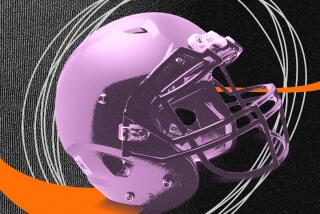Wheeler Workout Being Checked
- Share via
EVANSTON, Ill. — Amid the threat of legal action and the potential of an NCAA rules inquiry into the Aug. 3 preseason workout at which senior safety Rashidi Wheeler collapsed and then died, Northwestern on Thursday launched a 2001 football season that once held such promise but now will serve as a study in grief, distraction and controversy.
Third-year Coach Randy Walker said Thursday that the drill had not violated NCAA rules detailing permissible summer workouts. In general, the rules forbid football coaches from running summer conditioning. They also say that any summer workout must be voluntary.
“It was a voluntary workout,” Walker said. “We can prove it.”
But the Rev. Jesse Jackson, who in recent days has acted as a spokesman for Wheeler’s family, offered a contrasting view. He said in a telephone interview, “It was a supervised workout with consequences to it, so it was official in the view of the players. So it is a violation.”
An NCAA spokeswoman, Jane Jankowski, said a school with reason to suspect a violation performs its own review and presents the findings to the NCAA--and, if appropriate, a proposed penalty. She declined to speculate on an appropriate penalty should a violation be shown at Northwestern, saying only that any punishment is required to be “related to the violation that occurred.”
Northwestern officials had sought Thursday to keep the focus on football. Most experts had picked the Wildcats, who finished in a three-way tie atop the Big Ten standings last season, to win the conference title this year. Some optimists had even gone so far as to raise the prospect of Northwestern--for decades, the doormat of college football--playing for the national championship next January in the Rose Bowl game.
But that was all before Wheeler died after a rigorous conditioning drill--a test that Walker had mandated his players pass before playing.
Walker has made no apologies for insisting that his players be in superb physical shape, and said Thursday, “If you’re talking about safety, about doing the right things for kids, conditioning is essential.”
The drill involved 28 sprints, ranging from 100 to 40 yards. Wheeler, a 22-year-old from Ontario and an asthmatic, collapsed with several sprints left, appeared to revive, then stopped breathing. He was pronounced dead minutes later at Evanston Hospital.
Meantime, several players confirmed Thursday that two cameras were on hand for the drill. One was pointed at the starting line, the other at the finish line, players said.
NCAA rules say that a player’s attendance and participation in a summer drill “may not be recorded for the purpose of reporting such information to coaching staff members or other student-athletes.”
The rules also say that “no athletics department member” watching the workout “may report back to the student-athlete’s coach any information related to the activity.”
It is unclear who has custody of any film shot Aug. 3 or who has seen it--or even whether the cameras worked, what the motive was in bringing cameras to the field and whose idea it was to have cameras on scene. Strength coach Larry Lilja, who ran the Aug. 3 drill, declined Thursday to answer questions.
The university announced last week it had begun an investigation into Wheeler’s death. Officials have since declined to answer questions about the investigation. Athletic department spokesman Mike Wolf, reading from a statement, said Thursday that Northwestern is studying “every aspect” of Wheeler’s collapse and death.
NCAA rules also say that neither school administrators nor athletic department staff may provide “recognition or incentives (awards) to a student-athlete based on his or her attendance or performance in the activity.”
Players went into the Aug. 3 drill with the understanding that if they passed, they would be exempt from running the drill when Northwestern’s official preseason camp opens--today in Kenosha, Wis. It is not clear whether that amounts to “recognition or incentive (awards).”
Athletic Director Rick Taylor could not be reached for comment.
Because of the investigation, Taylor instructed Walker a few days ago to stop using the drill. Walker has said he will comply.
Because of the NCAA rules prohibiting football coaches from summer workouts, Walker was not on the scene. He nonetheless has said he is accountable for what happened.
Several players said Thursday they believed that Northwestern trainer Tory Aggeler, who supervised the response to Wheeler’s collapse and administered CPR, had acted responsibly and diligently.
“It was chaos, you know,” junior linebacker Pat Durr said. “Thank God Tory is such a great trainer because he knew what to do right then and there.”
Wolf also said Thursday the university’s “thorough” and “diligent” investigation would also include the issue of whether the use of dietary supplements, particularly those including the stimulant ephedrine, banned by the NCAA and the International Olympic Committee, played a role in Wheeler’s collapse.
A preliminary report from the Cook County medical examiner’s office said bronchial asthma was the cause of Wheeler’s death. Autopsy reports, including toxicology tests, are pending.
Northwestern announced Thursday that it is retiring Wheeler’s jersey, No. 30. The Wildcats will also wear a patch on their jerseys in his honor.
Just before two buses pulled up Thursday afternoon to Ryan Field to take the team to Wisconsin, star running back Damien Anderson, who last year rushed for more than 2,000 yards, said while surveying a gathering of TV crews and newspaper reporters, “Kenosha right now is our sanctuary.”
He added a moment later, “Football is our healing tool right now. That’s where we’re trying to go. You know, you want to go to something that brings you, you know, peace.”
Meanwhile, heat has not been ruled out as a possible cause in the death of a 13-year-old football player who collapsed and died at practice Wednesday in Monticello, Ga.
Jasper County Coroner Billy Norris said the body of Jamarious Berez Bennett was sent to Atlanta for an autopsy.
*
Abrahamson reported from Evanston, Ill.; Pugmire reported from Ontario, Calif.
(BEGIN TEXT OF INFOBOX / INFOGRAPHIC)
NCAA Division I Regulations
17.02.13
Voluntary Athletically Related Activities.
In order for any athletically related activity to be considered “voluntary,” all of the following conditions must be met: (Adopted: 4/18/01)
(a) The student-athlete must not be required to report back to a coach or other athletics department staff member (e.g., strength coach, trainer, manager) any information related to the activity. In addition, no athletics department staff member who observes the activity (e.g., strength coach, trainer, manager) may report back to the student-athlete’s coach any information related to the activity;
(b) The activity must be initiated and requested solely by the student-athlete. Neither the institution nor any athletics department staff member may require the student-athlete to participate in the activity at any time. However, it is permissible for an athletics department staff member to provide information to student-athletes related to available opportunities for participating in voluntary activities (e.g., times when the strength and conditioning coach will be on duty in the weight room or on the track);
(c) The student-athlete’s attendance and participation in the activity (or lack thereof) may not be recorded for the purpose of reporting such information to coaching staff members or other student-athletes; and;
(d) The student-athlete may not be subject to penalty if he or she elects not to participate in the activity. In addition, neither the institution nor any athletics department staff member may provide recognition or incentives (e.g., awards) to a student-athlete based on his or her attendance or performance in the activity.
More to Read
Go beyond the scoreboard
Get the latest on L.A.'s teams in the daily Sports Report newsletter.
You may occasionally receive promotional content from the Los Angeles Times.











